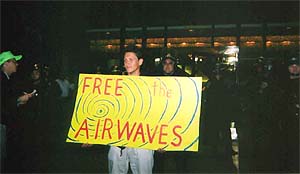|
Latest CDC
News
|

LPFM
advocates demonstrate outside the National Association of
Broadcasters "Marconi Awards" ceremony, San Francisco Hilton,
Sept. 23, 2000.
|
Friday,
October 27, 2000
LPFM
remains in limbo as Congress and the White House are at loggerheads
with several controversial spending and policy measures still
unresolved.
On
October 26, the House of Representatives approved a Commerce State
Justice appropriations bill that includes anti-LPFM legislation.
Today, the Senate also passed this legislation. Yesterday, before
the House vote, President Clinton indicated in a letter to
congressional leaders that he would veto the bill, with LPFM being
one of the items that would have to be resolved.
The
entire letter can be viewed here: http://www.whitehouse.gov/library/hot_releases/October_262000_3.html
but it reads in part:
"We also understand that a range of
anti-environmental, anti-competitive, and other damaging riders have
been under consideration and may have been added to this bill. I
urge Congress to refrain from adding riders that would reward
special interests at the expense of the public interest. I also urge
Congress to drop the rider that would prevent the Federal
Communications Commission from licensing new low-power FM radio
stations to provide for a diversity of voices in communities around
the country."
We
believe the President is sincere in his support for LPFM, and see no
reason why he would back down from this position. Senator McCain
gave a dramatic speech on the Senate floor on behalf of LPFM. I will
try to distribute a transcript when I can get my hands on it. McCain
clearly linked the challenge to LPFM to the larger problem of
special interest power in Washington, and apologized to community
groups and other LPFM supporters for the rider being attached to
this appropriations measure.
So,
this is where we are:
- The
overall political process is incredibly messed up at this point.
There are many ways congress and the president can try to resolve
their differences, but it is likely that congress will go ahead
and send the president the CJS bill and he will veto it. The
timing on this is uncertain, since congress has some control over
when the bill is sent up to the white house. Most likely, this
will all be resolved around next Tuesday.
- On
the policy side, we are in pretty good shape. The White House is
also pushing for immigration reform, expansion of hate crimes
laws, money for the justice department to sue tobacco companies
and a few other items. The danger to LPFM is if the president gets
everything else he wants on his list, which to me feels incredibly
unlikely at this point.
- I
know this is beating a dead horse, but one way to back up the
President is by contacting your senators and congressmen. Our Web
site at http://congress.nw.dc.us/lpr
has generated 3,200 emails this month, with about 450 coming in
the last two days.
- Also, make sure you attend campaign rallies over the next
ten days. If your congressman or senator has opposed LPFM, call
them on it. All we can do is get this out in the open. I strongly
encourage you to turn up the heat on your own contacts to make
sure congress feels some pain from home.
-Michael Bracy (Low Power Radio Coalition)
NPR Information
- Click
here to read the National Public Radio press release about
their continued opposition to microradio.
- Click here to see
photos and details about a CDC-organized presentation to the NPR
Board when it met in San Francisco on September 23, 2000.
- Go
to indybay.com
for Peter Franck's assessment of anti-LPFM legislation and how NPR
is involved.
- Read
the ad placed in the New York Times, "We want
more public radio. Why doesn't NPR?" (pdf file).
LPFM License Application
Information
The FCC
is accepting LPFM (micro-radio) license applications from five
sets of states at a time. For each set or group of states there
will be only five days in which to file an application. Those
five days are called a "filing window".
The
next filing window will be in late November, 2000, for the following
states:
- American Samoa
- Colorado
- Delaware
- Hawaii
- Idaho
- Missouri
- New York
- Ohio
- South Carolina
- South Dakota
- Wisconsin
For
application information and assistance, please view the CDC Licensing Project:
LPFM Licensing Application Information.
Click
on this September
15th FCC news release to find out how many stations filed for
LPFM licenses during the second filing window (August 28 - September
1, 2000).
About the National Lawyers Guild
Center for Democratic Communications
The
Center for Democratic Communications (CDC) of the National Lawyers
Guild has been working for the rights of grass roots, community
and union groups to have their own "micro radio" stations for more
then 11 years. First defending the free speech of micro broadcasters
in the courts, then lobbying the FCC to legalize micro radio (or
LPFM, as the FCC prefers to call it) in a realistic and democratic
way, and now helping groups understand and work with the FCC's
licensing process. With other groups, CDC is also persuading
congress to let this go forward, and not to pass various bills (now
pending) which would take away from the FCC the power to license
LPFMs. |

